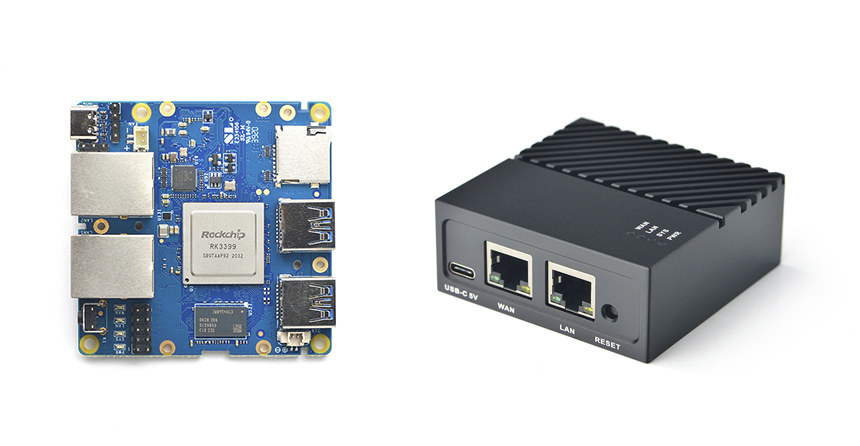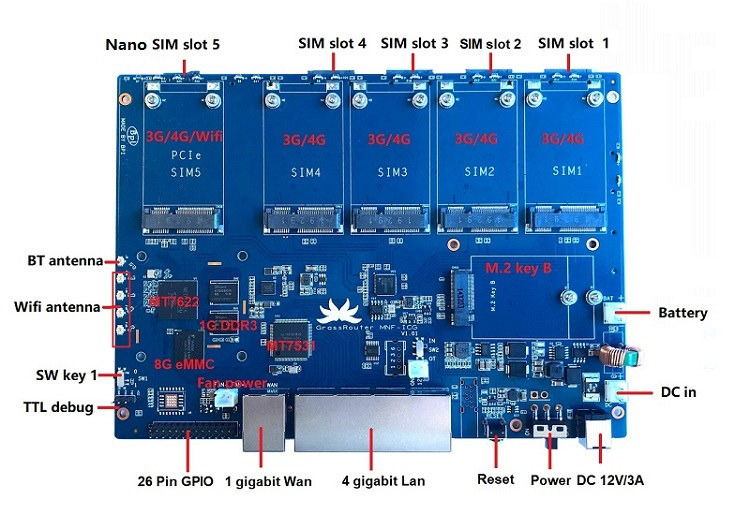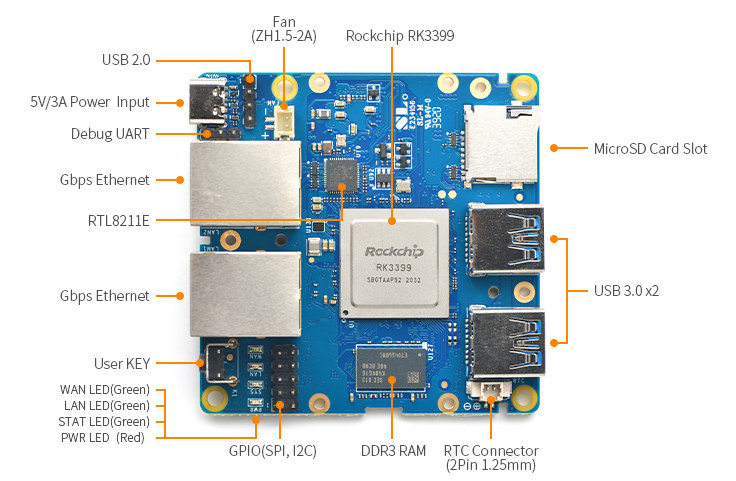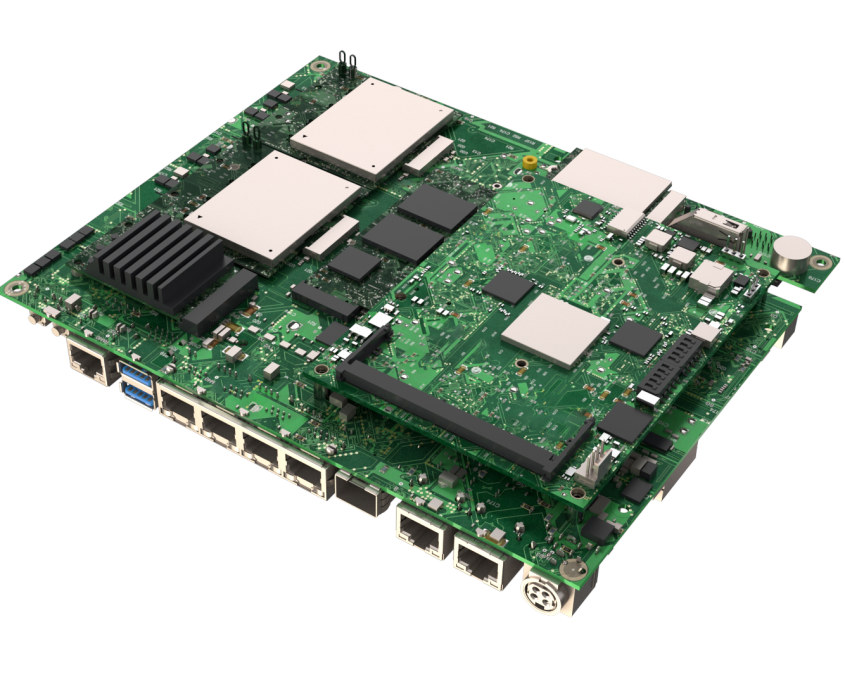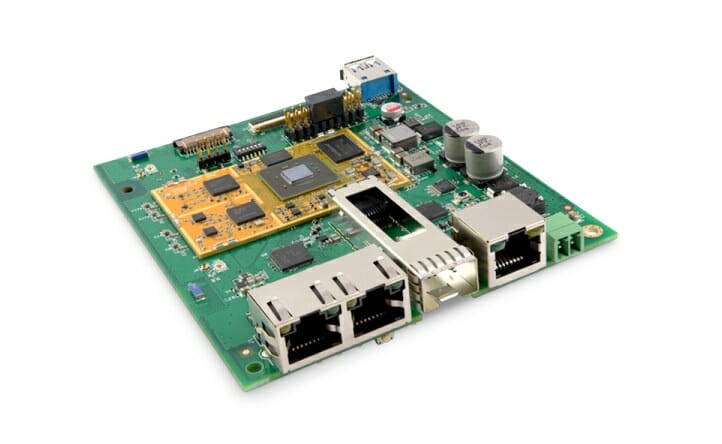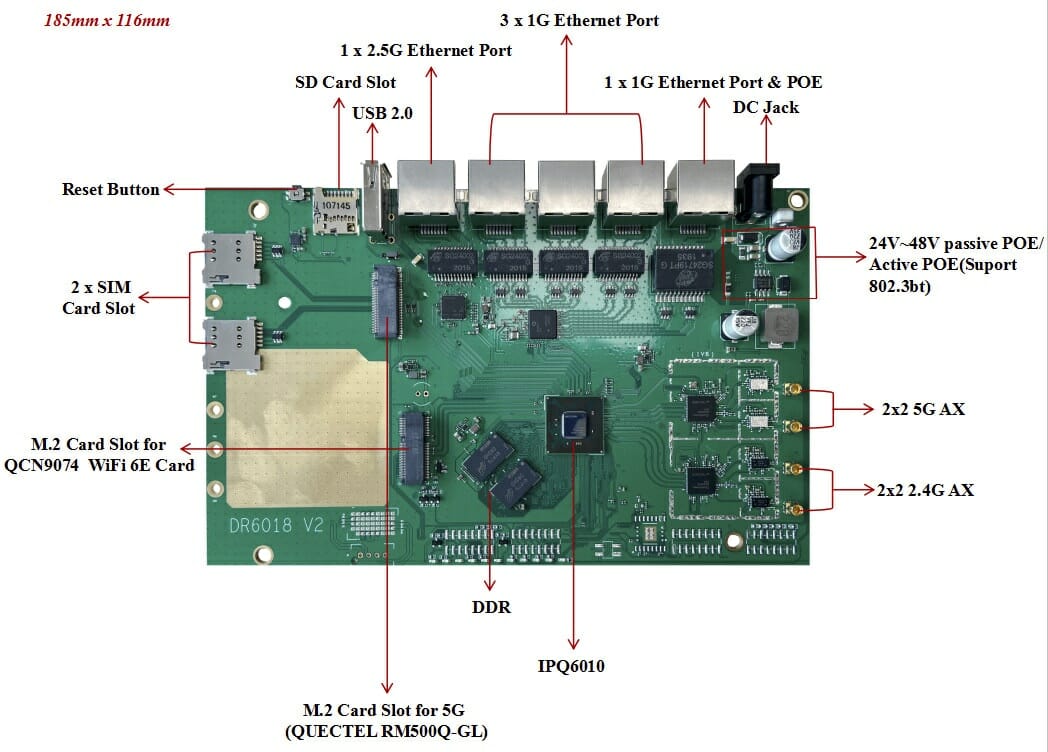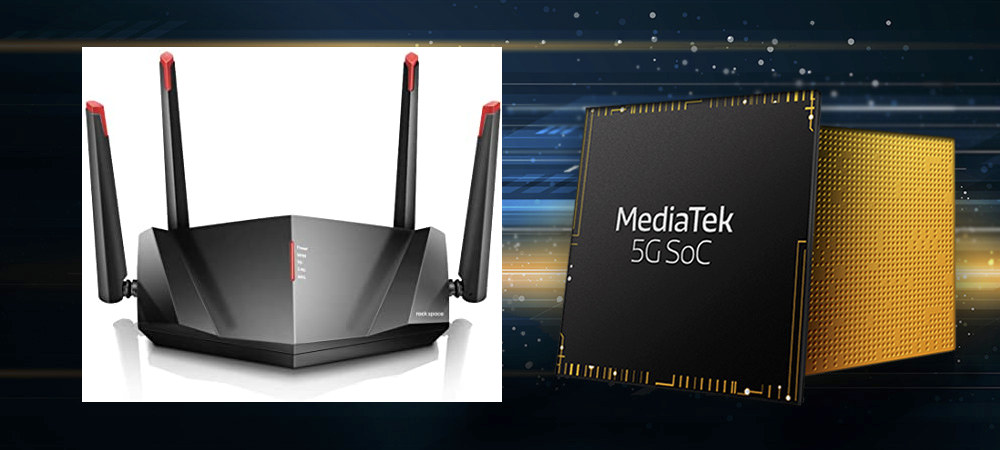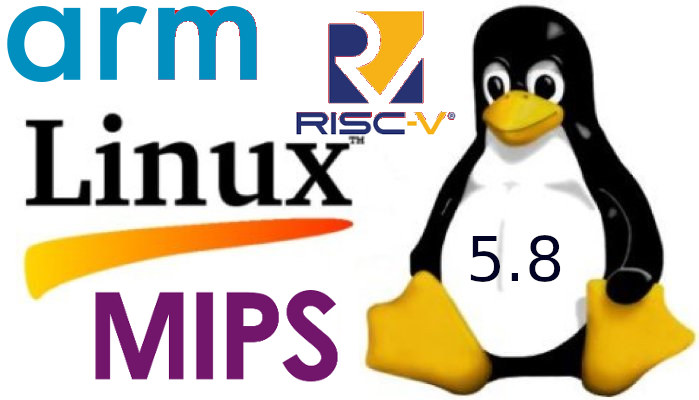We found NanoPi R4S board in a work-in-progress Wiki last month. The tiny single board computer is designed for headless applications but comes with much better specifications compared to similar boards with a Rockchip RK3399 hexa-core processor with up to 4GB RAM, dual Gigabit Ethernet, and USB 3.0 ports. At the time we had limited information, but FriendlyELEC has now started selling the board for $45 and up, together with an optional metal case for a fanless operation that should ensure very good cooling. Here’s a reminder of NanoPi R4S specifications: SoC – Rockchip RK3399 hexa-core processor with dual-Core Cortex-A72 up to 2.0GHz, quad-core Cortex-A53 up to 1.5GHz, Mali-T864 GPU with OpenGL ES1.1/2.0/3.0/3.1, OpenCL, DX11, and AFBC support, 4K VP9 and 4K 10-bit H265/H264 60fps video decoder System Memory – 1GB DDR3 or 4GB LPDDR4 Storage – MicroSD card slot Networking – 2x GbE, including one native Gigabit Ethernet, and […]
Cellular gateway board takes up to five 4G mini PCIe cards, one 5G M.2 module, seven SIM cards
One Banana Pi customer asked them to customize Banana Pi BPI-R64 Linux router board based on MediaTek MT7622 WiFi processor as part of their “BPI 4.0 server” OEM/ODM customization service. Specifically, they were asked to design a cellular gateway board with the same five Gigabit Ethernet ports as on the original board, but adding five mini PCIe sockets and SIM card slots for 3G/4G cards, and one M.2 socket plus two SIM cards for a 5G module. Here’s the result! Banana Pi “GrassRouter” cellular gateway board specifications: SoC – MediaTek MT7622E dual-core ARM Cortex-A53 processor @ 1.35GHz System Memory – 1 or 2GB RAM Storage – 8GB eMMC flash, MicroSD card slot Connectivity Cellular 1x 5G via M.2 Key-B module (USB 3.0 or PCIe bus), 2x SIM card slots. Up to 5x 3G/4G LTE via mPCIe expansion socket, 5x SIM card slots Ethernet – 5x Gigabit Ethernet ports (4x LAN […]
NanoPi R4S headless RK3399 SBC features up to 4GB RAM, dual Gigabit Ethernet, USB 3.0 ports
We’ve seen several tiny ultra-cheap boards for headless applications over the last few years with products Orange Pi Zero Plus or NanoPi R2S which are usually based on 32-bit Cortex-A7 or low power 64-bit Cortex-A53 processors, coupled with up to 512MB to 2GB, and may have some limitations when it comes to Gigabit Ethernet and USB 3.0 speeds. If you’d like something similar but more powerful, FriendlyELEC is working on NanoPi R4S headless SBC powered by a Rockchip RK3399 hexa-core Cortex-A72/A53 processor with up to 4GB RAM, dual Gigabit Ethernet, and two USB 3.0 ports. NanoPi R4S preliminary specifications: SoC – Rockchip RK3399 hexa-core processor with dual-Core Cortex-A72 up to 2.0GHz, quad-core Cortex-A53 up to 1.5GHz, Mali-T864 GPU with OpenGL ES1.1/2.0/3.0/3.1, OpenCL, DX11, and AFBC support, 4K VP9 and 4K 10-bit H265/H264 60fps video decoder System Memory – 1GB DDR3 or 4GB LPDDR4 Storage – MicroSD card slot Networking – […]
ClearFog CX CN9K Mini-ITX 10GbE/5GbE networking SBC runs Linux or FreeBSD
Last year, SolidRun introduced ClearFog CX LX2X networking single board computer offering up to 100GbE via NXP LX2160A 16-core Cortex-A72 communication processor that followed ClearFog CX 8K ARMADA 8040 networking board launched the year before. The Israeli company is now working on two ClearFog CX CN9K networking SBC’s powered by CEx7 CN913x system-on-module featuring Marvell Octeon TX2 CN913x quad-core Cortex-A72 processor and offering multi-gigabit Ethernet with various 10Gbps, 5Gbps, and Gigabit Ethernet ports. ClearFog CN9132 Pro The higher-end version of the ClearFog CX CN9K boards is ClearFog CN9132 Pro with the following specifications: CEx7 CN9132 COM Express Type 7 module SoC – Marvell OCTEON TX2 CN9132 quad-core Arm Cortex A72 up to 2.2 GHz (Industrial temperature up to 2.0 GHz) System Memory – Up to 16GB SO-DIMM DDR4 up to2400MT/s (not included by default) Storage – Up to 32 GB eMMC flash, SPI NOR flash COM Express Type 7 board-to-board […]
Mango-DVK OpenWrt Devkit Features 2.5GbE, WiFi 6 SoM powered by Qualcomm IPQ6000/IP6010 SoC
We’ve been covering some 802.11ax WiFI 6 embedded networking boards from Wallys Communications and Compex in the last few months, but 8devices has now entered the fray with Qualcomm IPQ6000/IPQ6010 powered Mango WiFi 6 system-in-module available in commercial or industrial temperature range, as well as as a development kit based on the module. Mango SoM supports dual-band 2×2 MiMo 802.11ax and multi-Gigabit Ethernet connectivity, features up to 2GB RAM, 256MB NAND flash, and runs OpenWrt Linux with target applications including routers, gateways, and access points. Mango SoM Specifications: SoC (one or the other) Qualcomm IPQ6000 quad-core Cortex-A53 processor @ up to 1.2 GHz with hardware NAT engine, HW crypto Qualcomm IPQ6010 quad-core Cortex-A53 processor @ up to 1.8 GHz with hardware NAT engine, HW crypto System Memory – 512MB DDR3L 512MB (up to 2GB) Storage – 32MB NOR FLASH, up to 256MB NAND flash Networking Wireless 2.4GHz 802.11 b/g/n/ac/ax WiFi […]
DR6018 V2 Embedded WiFi 6 Router Board Adds Support for WiFi 6E and 5G IoT M.2 Cards
A few months ago we covered DR6018 (aka CP01) WiFi 6 Embedded SBC powered by Qualcomm IPQ6018 processor and offering six Ethernet ports including five Gigabit interfaces and one 2.5 Gbps Ethernet port. Wallys Communications has now informed CNX Software they had a new version of the board called DR6018 V2 with a more compact form factor, support for PoE, as well as optional WiFi 6E and 5G IoT M.2 modules. DR6018 V2 board specifications: SoC – Qualcomm Atheros IPQ6010 quad-core Arm Cortex-A53 processor @ 1.8 GHz System Memory – 1GB (2x 512MB) DDR3L 16-bit interface with 32-bit memory bus design Storage – 256MB NAND Flash, 32MB NOR flash, SD card slot Networking Wired 3x Gigabit Ethernet ports (one less compared to DR6018) 1x Gigabit Ethernet port with PoE support 1x 2.5Gbps Ethernet port Wireless WiFi 2×2 2.4GHz MU-MIMO OFDMA 802.11b/g/n/ax WiFi 6, max 23dBm per chain 2×2 5GHz MU-MIMO […]
MediaTek T750 5G Chipset to Power Fixed Wireless Access Routers and 5G Mobile Hotspots
Most of the 5G modem we covered are designed for mobile devices, but 5G technology also brings opportunities for fixed wireless access routers (FWA routers) potentially replacing fixed broadband modem routers, as well as for 5G mobile hotspots to add coverage in areas without reliable cellular signal. Those are the two markets targetted by the just-announced 7nm MediaTek T750 quad-core Arm processor with support for sub-6GHz frequencies aiming to affordable broadband connectivity to areas with limited DSL, cable, or fiber services, or on the contrary adding wireless services in suburban, rural, and less developed areas. Mediatek T750 5G SoC highlights: Processor – Quad-core Arm Cortex-A55 CPU GPU / Display – Embedded GPU and display driver to support up to 720p displays Cellular Networking 5G NR FR1 modem with sub-6GHz frequencies support and two-component carrier aggregation (2CC CA) for extended coverage Standalone and non-standalone (SA/NSA) modes supported 5CC LTE carrier aggregation […]
Linux 5.8 Release – Main Changes, Arm, MIPS, and RISC-V Architectures
Linus Torvalds has just released Linux 5.8: So I considered making an rc8 all the way to the last minute, but decided it’s not just worth waiting another week when there aren’t any big looming worries around. Because despite the merge window having been very large, there really hasn’t been anything scary going on in the release candidates. Yeah, we had some annoying noise with header file dependencies this week, but that’s not a new annoyance, and it’s also not the kind of subtle bug that keeps me up at night worrying about it. It did reinforce how nice it would be if we had some kind of tooling support to break nasty header file dependencies automatically, but if wishes were horses.. Maybe some day we’ll have some kind of SAT-solver for symbol dependencies that can handle all our different architectures and configurations, but right now it’s just a manual […]


